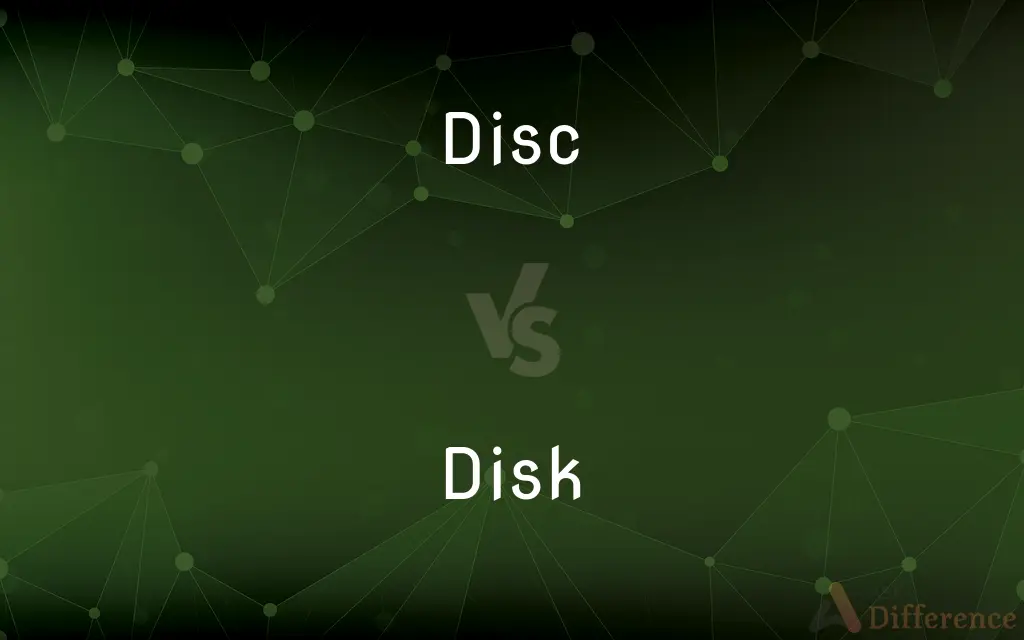Disc vs. Disk — What's the Difference?
Edited by Tayyaba Rehman — By Fiza Rafique — Updated on October 5, 2023
"Disc" primarily refers to flat, thin circular objects or recordings, such as CDs. "Disk," on the other hand, often denotes storage devices like hard drives or certain flat, round anatomical structures.

Difference Between Disc and Disk
Table of Contents
ADVERTISEMENT
Key Differences
Both "disc" and "disk" can refer to flat, rounded objects or shapes. However, "disc" is more frequently used in the context of optical media, such as CDs or DVDs. "Disk," conversely, is commonly associated with magnetic storage devices, like floppy disks or hard drives.
The use of "disc" and "disk" can also be influenced by regional preferences. In British English, "disc" tends to be more prevalent for many contexts, while "disk" is the preferred spelling in American English, especially when talking about computers.
In anatomy, both words have distinct meanings. "Disc" usually pertains to flatter, round structures, like the intervertebral discs in the spine. "Disk," on the other hand, might describe structures like the optic disk in the eye.
The historical use of "disk" can trace back to the times when floppy disks were the primary storage medium. As technology evolved, CDs and DVDs became popular, and "disc" emerged as the standard spelling for these optical media. However, when referring to computer hard drives, "disk" remains the standard, as in "hard disk drive" or HDD.
Beyond technology and anatomy, "disc" often denotes objects like brake discs in vehicles, while "disk" can refer to round, flat objects in various contexts, including astronomy, where it might describe the appearance of celestial bodies.
ADVERTISEMENT
Comparison Chart
Common Uses
Optical media (CDs, DVDs).
Magnetic storage (floppy disk, hard drive).
Regional Preferences
More common in British English for various contexts.
Preferred in American English, especially for computer-related contexts.
Anatomical Context
Intervertebral discs in the spine.
Optic disk in the eye.
Associated Technology
Compact Disc (CD), Digital Versatile Disc (DVD).
Hard Disk Drive (HDD), floppy disk.
General Description
Flat, thin circular objects or recordings.
Storage devices or certain flat, round anatomical structures.
Compare with Definitions
Disc
Optical media used for storage or playback.
The movie came on a Blu-ray disc.
Disk
Magnetic storage medium in computers.
The computer has a 1TB hard disk.
Disc
A specific type of intervertebral structure in the spine.
He suffered from a slipped disc.
Disk
A natural or man-made object resembling a flat circle.
The sun appeared as a fiery disk on the horizon.
Disc
A flat, thin, circular object or plate.
He placed the disc on the turntable and played the music.
Disk
US spelling of disc, also widely used in computing contexts
Disc
A brake component in vehicles.
The mechanic replaced the worn-out brake disc.
Disk
A thin, flat, circular object or plate.
Disc
A flat, thin circular object
A man's body with an identity disc around the neck
Coins were made by striking a blank disc of metal
Disk
Something resembling such an object
The moon's disk was reflected in the pond.
Disc
An object or part resembling a disc in shape or appearance
The smudged yellow disc of the moon
Disk
The disk used in a disc brake.
Disc
Variant of disk.
Disk
A disk used on a disk harrow.
Disc
A thin, flat, circular plate or similar object.
A coin is a disc of metal.
Disk
A round, flattened structure in a plant or animal, such as an intervertebral disk.
Disc
(anatomy) An intervertebral disc.
Disk
(Botany) The central area bearing numerous disk flowers in the flower head of a composite plant such as a daisy.
Disc
Something resembling a disc.
Venus's disc cut off light from the Sun.
Disk
An optical disc, especially a compact disc.
Disc
A vinyl phonograph / gramophone record.
Turn the disc over, after it has finished.
Disk
A magnetic disk, such as a floppy disk or hard disk.
Disc
(botany) The flat surface of an organ, as a leaf, any flat, round growth.
Disk
The data stored on such objects.
Disc
(disc sports) flying disc; frisbee; generic name for the trademark {{en}};
Disk
A phonograph record.
Disc
(agriculture) To harrow with a disc harrow.
Disk
A circular grid in a phototypesetting machine.
Disc
To move towards, or operate at, zero blade pitch, orienting the propeller blades face-on to the oncoming airflow and maximising the drag generated by the propeller.
In the air, the asymmetric drag generated by a discing propeller can result in loss of control of the airplane.
Disk
To work (soil) with a disk harrow.
Disc
A flat round plate
Disk
To make (a recording) on a phonograph record.
Disc
Sound recording consisting of a disc with continuous grooves; formerly used to reproduce music by rotating while a phonograph needle tracked in the grooves
Disk
A thin, flat, circular plate or similar object.
A coin is a disk of metal.
Disc
Something with a round shape like a flat circular plate
Disk
(figuratively) Something resembling a disk.
Venus' disk cut off light from the Sun.
Disc
(computer science) a memory device consisting of a flat disk covered with a magnetic coating on which information is stored
Disk
(anatomy) An intervertebral disc
Disc
A flat circular plate
Disk
(dated) A vinyl phonograph/gramophone record.
Turn the disk over, after it has finished.
Disc
A shape or form resembling a flat circle.
She wore earrings in the shape of a golden disc.
Disk
(computer hardware) floppy disk - removable magnetic medium or a hard disk - fixed, persistent digital storage.
He still uses floppy disks from 1979.
Disk
A disc - either a CD-ROM, an audio CD, a DVD or similar removable storage medium.
She burned some disks yesterday to back up her computer.
Disk
(agriculture) A type of harrow.
Disk
(botany) A ring- or cup-shaped enlargement of the flower receptacle or ovary that bears nectar or, less commonly, the stamens.
Disk
(agriculture) To harrow.
Disk
To move towards, or operate at, zero blade pitch, orienting the propeller blades face-on to the oncoming airstream and maximising the drag generated by the propeller.
Disk
A discus; a quoit.
Some whirl the disk, and some the javelin dart.
Disk
A flat, circular plate; as, a disk of metal or paper.
Disk
The circular figure of a celestial body, as seen projected of the heavens.
Disk
A circular structure either in plants or animals; as, a blood disk; germinal disk, etc.
Disk
The whole surface of a leaf.
Disk
The anterior surface or oral area of cœlenterate animals, as of sea anemones.
Disk
Something with a round shape like a flat circular plate
Disk
A flat circular plate
Disk
Sound recording consisting of a disc with continuous grooves; formerly used to reproduce music by rotating while a phonograph needle tracked in the grooves
Disk
(computer science) a memory device consisting of a flat disk covered with a magnetic coating on which information is stored
Disk
Draw a harrow over (land)
Disk
A flat, thin, round plate or object.
She wore a pendant with a beautiful jade disk.
Disk
A round, flattened structure in anatomy.
The doctor examined the patient's optic disk.
Disk
A data storage device, especially in computers.
He bought an external disk for backups.
Common Curiosities
Which is used for CDs, "disc" or "disk"?
CDs are referred to as "discs."
Can "disc" be used in an anatomical context?
Yes, "disc" can refer to structures like the intervertebral discs in the spine.
Is "disk" ever used for optical media?
Generally, "disc" is the standard for optical media, but usage can vary.
What does the "disk" in "floppy disk" refer to?
It refers to the magnetic storage medium used in the floppy.
Are DVDs referred to as "disks"?
DVDs are typically referred to as "discs."
Which spelling is more common for the brake component in vehicles?
The term "brake disc" is commonly used.
Are Blu-rays "disks" or "discs"?
Blu-rays are typically referred to as "discs."
Which term is more common in American English for hard drives?
In American English, "disk" is the common term for hard drives.
Which term, "disc" or "disk," is older?
Both terms have ancient roots, but their modern usage in technology gives them new distinctions.
Which term is prevalent in British English for computer storage?
While "disk" is often used for hard drives, British English might use "disc" in broader contexts.
Is the term "disk" related to "discus"?
Both terms have roots in Latin and Greek words for flat, round objects, but their modern usages have diverged.
Can "disc" denote any thin, flat, circular object?
Yes, "disc" can describe any object with that shape, from coins to plates to recordings.
Are there contexts where "disc" and "disk" can be used interchangeably?
In some general contexts, they might be interchangeable, but specific industries and regions have preferred usages.
Can "disk" be used in an astronomical context?
Yes, "disk" can describe the appearance or shape of celestial bodies.
In anatomy, what does "disk" commonly refer to?
"Disk" might describe structures like the optic disk in the eye.
Share Your Discovery

Previous Comparison
Plan vs. Sketch
Next Comparison
Lonely vs. AloneAuthor Spotlight
Written by
Fiza RafiqueFiza Rafique is a skilled content writer at AskDifference.com, where she meticulously refines and enhances written pieces. Drawing from her vast editorial expertise, Fiza ensures clarity, accuracy, and precision in every article. Passionate about language, she continually seeks to elevate the quality of content for readers worldwide.
Edited by
Tayyaba RehmanTayyaba Rehman is a distinguished writer, currently serving as a primary contributor to askdifference.com. As a researcher in semantics and etymology, Tayyaba's passion for the complexity of languages and their distinctions has found a perfect home on the platform. Tayyaba delves into the intricacies of language, distinguishing between commonly confused words and phrases, thereby providing clarity for readers worldwide.















































